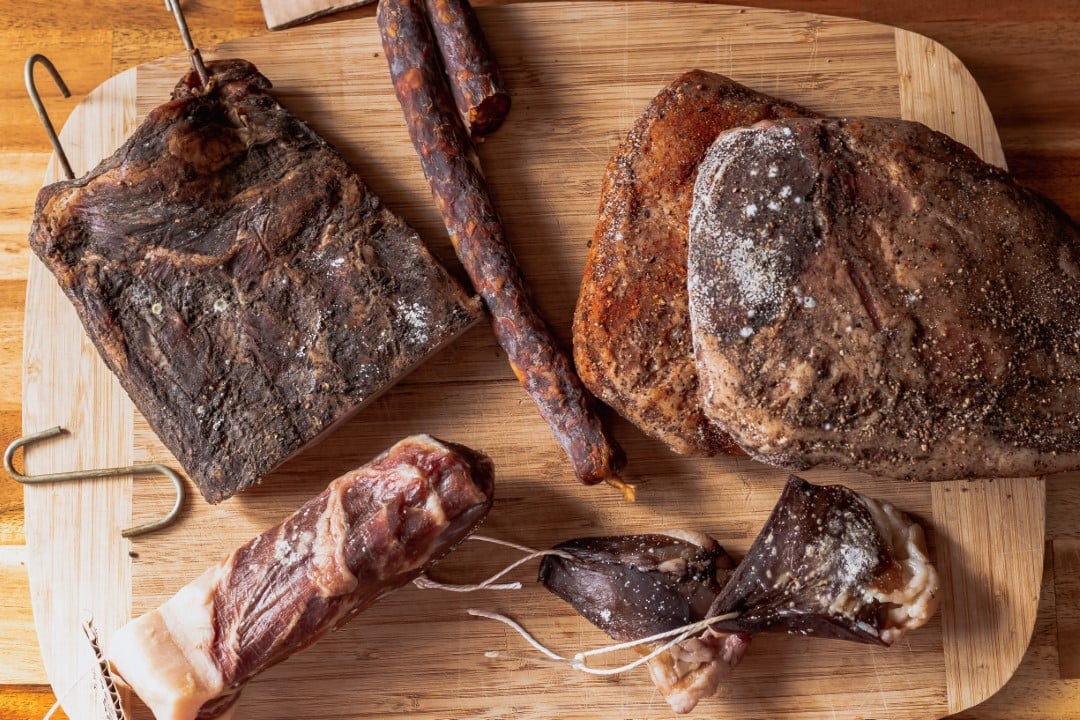I’m not here to convince you whether nitrates should or shouldn’t be used in curing meat. That’s a personal decision. What I can share is what I’ve learned from years of curing, researching, and tasting a variety of cured meat projects.
In my dry-curing projects—especially with whole muscle meats that are air-dried and consumed raw—I generally avoid the use of nitrates. But there are situations where I understand why others do use them. For instance, the pancetta I make for cooking is treated differently from the prosciutto-style cuts that I hang for many months and eat as is.
It’s worth starting with some science. A food scientist wrote an excellent piece on the chemistry of nitrates and nitrites in cured meats, exploring how they act as preservatives and the reactions they trigger. Here’s that article if you’d like to dive in.
The issue I have is how differently meats get lumped together. One article that stood out to me explores the stark contrast between traditionally cured meats like prosciutto and industrially processed meats like frankfurters. Organizations like the WHO often categorize them as the same “processed meat” category, which doesn’t accurately reflect the actual production or ingredients. You can read that article here.
The takeaway from some of this research is that cooking meats containing nitrates, such as bacon, to a crisp can change how those compounds behave. That’s different from dry-cured meats that are never heated. It’s a key reason I prefer avoiding nitrates in projects intended for consumption raw or thinly sliced.
For example, when I make carbonara at home, I use my own nitrate-free pancetta. I’m confident in the quality of the meat and the dry curing process I use. For meats that are not cooked, such as my bresaola or coppa, I prefer the simplicity of salt, time, and a controlled environment.

These distinctions matter. Bacon and prosciutto may share a reddish-pink color, but they are distinctly different products, both in their processing and intended use. Prosciutto undergoes a long process of drying and fermentation with just salt. Bacon is often brined or injected and then cooked, sometimes hot-smoked too.
One of the most informative pieces I’ve read on this topic is from The Guardian, which dives deep into the link between processed meats and health concerns. It also shows how oversimplification by regulatory groups can blur important lines between artisanally dry-cured products and mass-produced meats. Read the full article here.
If you’re curious about the broader scope of dry curing, I’ve created an entire guide that walks through many traditional techniques. Explore the dry curing section here.
Why I Avoid Nitrates in Most of My Cured Meats
To be clear, using nitrates is a personal choice. I’ve chosen not to use them in many of my cured meat recipes because I’ve seen what’s possible with just salt, time, and the right conditions.
There are two local producers near me who have gone nitrate-free commercially. To meet food safety standards, they rely on pH testing, moisture control, and HACCP-like procedures to ensure that their cured meats remain safe and shelf-stable. Their results have been impressive.
If you’re starting out or looking to make a decision for yourself, I suggest reading up on the topic. Here’s a list of some of the best meat curing books I’ve read—from Ruhlman’s Salumi to Maranski’s guides.
Do your research, consider your curing style, and make a decision that aligns with your own goals and safety priorities.
Making Informed Choices About Nitrate Use
Whether or not to use nitrates when curing meat is a decision each person needs to make based on knowledge, research, and comfort level. I’m not here to argue for or against it—I’m simply sharing what I’ve learned, what I do personally, and the resources that helped me along the way.
For example, when I make pancetta that will be cooked—like for carbonara—I don’t use nitrates. I rely on meat quality and proper dry curing techniques instead. This approach works for me because I understand the risks, control the environment, and make small batches. But that doesn’t mean it’s the right choice for everyone.
In contrast, when using bacon that will be fried until crispy, the use of curing salts that include nitrates or nitrites is more common and considered a safety measure, especially for long-term fridge storage or commercial sales. Cooking also significantly reduces the nitrite content, which is one of the key points highlighted in modern studies.
Bacon vs Prosciutto – They Are Not the Same
One common frustration I have is how certain public health agencies lump all “processed meats” together—treating fast-food sausages the same as traditionally dry-cured meats like prosciutto. In reality, bacon and prosciutto are entirely different, both in production and in how they’re eaten.
Prosciutto is eaten raw, air-dried for 12+ months, and consists of just pork and sea salt. Bacon is cured for a short time and cooked before eating, often with added nitrates/nitrites, sugar, and smoke. These are different foods that deserve different classifications.
One news piece that helped me understand this distinction better is this article from The Guardian, which unpacks the science and politics behind processed meat definitions.
Another key read is a Food Navigator article that highlights how risk assessment often lacks nuance, especially between preserved meats that are cooked versus dry-cured and eaten raw.
I’ve also referenced a great breakdown on the Cravings of a Food Scientist blog. It dives into the food chemistry of nitrates and nitrites with an approachable tone backed by real science.
If your projects involve eating dry-cured meats raw (like I do), the risks and variables are very different from someone curing meat meant to be cooked. This is where learning and adapting matter most.
Navigating the Nitrate Conversation
Whether you choose to use nitrates or not, the decision ultimately comes down to your values, the style of cured meat you’re making, and your level of control over the curing environment.
I’m not trying to tell anyone what’s right or wrong — I’ve simply shared what I’ve learned through first-hand trial, research, and a few hard-earned lessons. Curing meat safely without nitrates can be done, especially for whole muscle projects, but it’s not something to approach casually.
Fermented or ground meats require much more precision and carry more risk. These are the styles where nitrate and nitrite salts have played a critical role in controlling pathogens like botulism, especially when drying spans weeks or months in varying conditions.
In contrast, dry curing whole muscle meat like coppa or pancetta, with strict temperature, airflow, and humidity control, can be successfully achieved using just high-quality sea salt — if you know what you’re doing.
Want to Dive Deeper? Here Are Some Reliable Sources
- The Guardian – Nitrates, Nitrites, and Cancer Risk
- Food Navigator – New Research Highlights Nuance in Processed Meats
- Cravings of a Food Scientist – A Breakdown of the Science
- NIH – Scientific Review of Nitrate Chemistry in Curing
- EFSA – Official Risk Assessments and Reports
- Book List – Best Reads for Learning the Craft
FAQs About Nitrates in Cured Meat
Can I cure meat safely without nitrates or nitrites?
Yes, especially with whole muscle cuts like pancetta or coppa, if you control moisture, temperature, and humidity carefully. Ground meats or fermented styles carry more risk.
Are nitrates really harmful?
They can form harmful compounds when cooked at high heat. But in uncooked dry-cured meats like prosciutto, they’re often used at safe levels and contribute to safety and color.
Do all types of cured meat need nitrates?
Not necessarily. Many traditional European styles are made with just salt and strict curing control. Others — especially sausages — require nitrates for safety.
What are some natural alternatives to curing salts?
Some use celery juice powder, which still contains natural nitrates. Others opt for salt-only cures, but this requires more experience and environmental precision.
Got thoughts or questions? Drop them in the comments below — I’m always keen to hear how others approach this and happy to help where I can.
Thanks for reading and taking the time to understand this nuanced topic. Whichever side you land on, the key is to stay curious and stay safe.

Tom Mueller
For decades, immersed in studying, working, learning, and teaching the craft of meat curing, sharing the passion and showcasing the world of charcuterie and smoked meat. Read More
